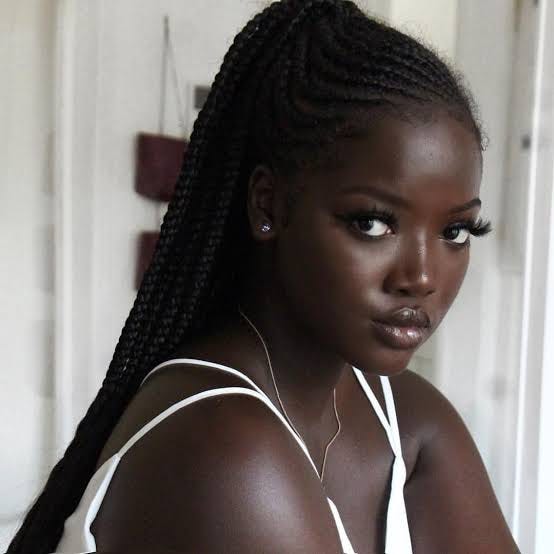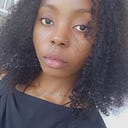Is My Black Really Beautiful?

“Oga I want to buy cocoa butter.”
The man stared at me, disbelief turning his face almost comical.
“Cocoa butter ke?” At my nod, “Are you ok? Why cocoa butter? You will get dark o. Fine girl like you no suppose dey use cocoa butter. I have many good creams that will bring out your color well well. E no go bleach you. E go just tone you, make your color sweet.”
I smiled as the man rambled on, giving raving reviews of different “toning” creams and the “safe” ingredients they had. It was funny because I knew after all the drama I would still buy either a bottle of cocoa butter or baby lotion.
In Nigeria, we have three distinct complexion spectrums:
•Fair
•Dark
•Chocolate (which is a complexion that isn’t quite dark and at the same time isn’t quite fair.)
This is me 😊

It is a coming of age ritual for young girls in the second and third category to migrate to the first through the help of skin bleaching agents. You are (generally) considered classier and mature when you do so (successfully). Praises of yellow pawpaw, “egovin”¹, “my color”, and “color gi na-aputazi” (your color is finally coming out) commend you on shedding your old skin. On the flip side, walking on the darker side of things is a whole different ball game. Don’t get me wrong, no one out rightly shames you or insults you for looking darker. It is those small, biting comments that make you look at your skin and ask “is my black is really beautiful?”:
“Isapugho ahu ofuma” (literally: you didn’t bathe well; figuratively: you’re not fresh enough)
“I na-etedikwa nke bu ude? I needili ibrighteni color gi.” (Do you even use creams? You need to brighten your color.)
“Oji that guy bu oji deti” (That guy’s dark complexion is dirty) (some dark tones, especially the cool tones that don’t shine as much, are thought to be dull and dirty by some people)
“I thought you would be fairer. I don’t really go out with dark girls; they act somehow.”
“You don’t look Yoruba o. Yoruba people are usually short and dark.”
“Dark girls are rude and loud”
“Fair girls are cleaner down there than dark girls.”
It makes me wonder: Is beauty synonymous with whiteness?
EfikZara

Colorism, while subtle, is a persistent problem in black Africa as a whole and Nigeria in particular. Bleaching creams have become a national staple with a bottle gracing most bedrooms. The skin lightening pandemic is so bad that some mothers pray for light-skinned babies and others resort to using Funbact-A, a popular anti-inflammatory, and antifungal cream to lighten the skin of their dark-skinned babies. Or brides that want only light skinned girls to join their wedding train. Growing up, I always wondered why people only told you “your color is now coming out” whenever you get fairer and never when you get darker. Back then, during the holidays, my complexion would lighten a shade or so from staying indoors all day and people (mostly women) would exclaim and make that statement. It always made me wonder: wasn’t the dark complexion still my complexion?

Later in life, I accepted it as one of those things; people wanted to be fair or be around/date fair people because society deemed fair people to be more attractive and desirable. It is what it is. Earlier this year, I learned this disregard, subtle or not, for darker complexions, among people of the same race is called Colorism and that it sometimes comes alone or in conjunction with two other –isms: texturism and featurism. But that is a story for another day.

Reading this medium post and watching YouTube videos on Colorism opened my eyes and got me thinking about a lot of things: I have a stunning friend whose boyfriend (now ex, thankfully) kept telling her how he always expected to end up with “a curvy, light-skinned slay queen” and not a dark girl like her. I found this annoying for so many reasons:
1. My friend was really beautiful and attractive
2. This was obviously a case of internalized self-hate because this guy was darker than she was
3. She began to actively source for high-grade skin lightening agents
4. I don’t believe people should force their partners to change their appearance cosmetically just to fit the standard that appeals to them
Dipped in chocolate, bronzed in elegance, enameled with grace, toasted with beauty. My lord, she’s a black woman.
Yosef A.A. Ben-Jochannan

Another brush with Colorism that will remain evergreen in my mind happened with a friend of my younger brother. We were talking about writing, Charles Bukowski, and photography when the discussion veered to relationships. The young man said he was attracted to fair girls. In his words, “the fairer the girl, the better.” I have no problem with this because I believe people love who they love and should be allowed to have- and go for- their preferences. However, I became disturbed when he said he wanted to marry a white or mixed lady because he wanted his daughters to be beautiful. He said, “If I have daughters with someone as dark as or darker than me, useless boys like me would have the guts to approach them. If she is mixed or something like that anyhow people no go approach her. If you just look at her skin and her hair, you go just arrange yourself.” I exchanged looks with both my brothers. I couldn’t help feeling sad about the triumphant and self-satisfied look on his face.
There is nothing wrong with dating outside your race; the problem arises however when you hold it up as a trophy.
Anonymous

Debra Willis in her seminar titled “Visualizing the Black Body in Photography and Popular Culture” says beauty is part of the architecture of the brain. The unfortunate thing is that this architecture can be altered and conditioned by the media. Nigeria is a consumerist society, lapping up anything and everything the Western Media puts forward. This can be a good thing but more often than not, it is a bad thing. I know tons of beautiful, feminine dark-skinned girls. However, most times the media feeds us the narrative of the masculine dark-skinned woman. Yes, there are still beautiful dark-skinned women in media spaces but there are very few. Light-skinned women get more modeling and acting roles than their dark-skinned counterparts. I feel this is why more and more actresses- upcoming or not- resort to bleaching their skin to fit society’s standard. In an episode titled, “Does Melanin Love Only Exist on the Gram,” one of the contributors on the program, The African Millennials, said that more often than not, for a dark-skinned woman to be seen as beautiful and attractive, she has to:
•Be “oiled up like chicken”, exoticized, fetishized, and oversexualized with terms like skin dripping in honey and references to certain foods flying around.
•Have non-ethnic features or an extremely sexy body

The second part echoes Nia Fernandez’s words when she says: “brown to dark-skinned women are held to much higher standards such as: having a straight or small nose, having hips and curves, looking “full” and having manageable or attractive hair....” On most #blackgirlmagic posts on IG, black girls that get promoted:
•Usually mixed or light skin
•Dark with features that are more Eurocentric
•Uber curvy (cue the baby oil)
This, I believe, is telling just a part of a very rich story


Recently, I read a 1975 short story collection titled “Secret Lives and Other Short Stories” by the Kenyan author, Ngugi Wa Thiong’o. In one of the short stories titled “Minutes of Glory”, Wa Thiong’o, through the actions of the main character, Beatrice, beautifully showed the unconscious colorist mentality a lot of Africans have. The story begins thus:
“Her name was Wanjiru. But she liked better her Christian one, Beatrice. It sounded purer and more beautiful...”
Some lines later, Wa Thiong’o lets us into Beatrice’s “philosophical” thoughts about internalized and unconscious black self-hatred and her quest to make herself “more beautiful and appealing”.
“By that time Ambi² had reached llomorog and Beatrice thought this would be the answer. Had she not, in Limuru, seen girls blacker than herself transformed overnight from ugly sins into white stars by a touch of skin-lightening creams? And men would ogle them, would even talk with exaggerated pride of their newborn girlfriends. Men were strange creatures, Beatrice thought in moments of searching analysis. They talked heatedly against Ambi, Butone³, Firesnow⁴, Moonsnow*, wigs, and straightened hair; but they always went for a girl with an Ambi-lightened skin and head covered with a wig made in imitation of European and Indian hair. Beatrice never tried to find the root cause of this black self-hatred, she simply accepted the contradiction and applied herself to Ambi with a vengeance. She had to rub out her black shame....”
Forty-five years later, the issues stated in this pageturner are still affecting the black community.
The black skin is not a badge of shame but rather a glorious symbol of national greatness
Marcus Garvey

The truth, like Debra Willis, puts it, is that beauty is both personal and political. As kids we all had personal descriptions of beauty and naturally saw ourselves as beautiful. But as we grew older, as society and the media gradually fed us their definition of beauty, we looked at that person in the mirror and found them wanting.

Instagram: @efikzara
To be fair, I know colorist stereotyping affects everyone irrespective of their complexions:
Fair women, while seen as calm, feminine, and beautiful, are often seen as promiscuous.
Dark skin is generally seen as ugly, dirty and unappealing and dark women are considered as masculine and belligerent
Fair men are seen as weak, fickle, intellectually-uninteresting fuck boys. In fact, at a TEDx talk I attended, Nigerian actor, Kalu Ikeagwu narrated how in the university, girls called him weak because he was light-skinned.
However, I feel people with darker skin tones suffer the effects of Colorism the most.

Source: A Poem from Hema Gopinathan Sah’s Page on Facebook
“If someone does not want me, it is not the end of the world. But if I do not want me, the world is nothing but endings.”
Nayyirah Waheed

Instagram: @efikzara
Colorism is a global epidemic and contrary to popular belief, it is very present in African societies. I know a lot of people would say Africa (Nigeria particularly) has more pressing problems like starvation, political, civil and religious unrest, COVID-19, and corruption to deal with. Nevertheless, Colorism is a real issue that affects us, our psyche, our day-to-day interactions and that makes it important. The possibility of passing this segregation and ingrained self hate down to our kids makes the situation more pitiable than it already is. Like Maya Angelou puts it, “When you know better, you do better”; being aware of this problem, making efforts to discard any colorist mentality you have internalized over the years, embracing and supporting corrective promotion and realizing dark-skinned people are not in any way less than, are some steps to doing better.
Like What You Read? Check my previous article: The Business of Hope and the Economics of Religion in Nigeria
Glossary
1. Egovin(Nig.)- Someone that’s preciously beautiful
2. Ambi- A lightening cream
3. Butone- A skin lightening cream
4. Firesnow- A skin lightening cream
5. Moonsnow- A skin lightening product
